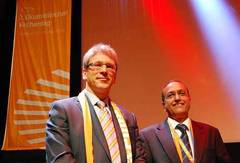Interfaith conversation and Bible study focus on God's compassion

WCC general secretary Dr Olav Fykse Tveit and Muslim scholar Dr Ataullah Siddiqui. Photo: Juan Michel/WCC
Muslims, Christians and people of other faiths should witness together to God's compassion in a world where too many suffer destitution and injustice, a Muslim scholar and a Christian leader agreed during an interfaith conversation and Bible study held at a 12-16 May German church convention (Kirchentag) in Munich.
Ultimately, it is “no advantage for Jews to be Jews, Christians to be Christians, and Muslims to be Muslims”, said Muslim scholar Dr Ataullah Siddiqui. What really matters, Siddiqui argued, is the “human concern” for “the poor and the needy”.
For the Rev. Dr Olav Fykse Tveit, general secretary of the World Council of Churches, “God is compassionate” and therefore asks people “to be compassionate”. All human beings have a common calling “to live according to God's will in this land”.
Siddiqui and Tveit were jointly conducting a so-called "dialogue Bible study" (Dialogbibelarbeit) on the text of the Gospel according to Matthew, chapter 25, verses 31-46, often referred to as “The judgment of the nations”.
The Bible study was part of the programme of the Kirchentag. This church convention, celebrated ecumenically for the second time, was organized by Protestant and Catholic lay movements and attracted about 125,000 participants.
For Tveit, the text of Matthew 25 does not intend to speculate “about scenarios for the future”, but rather to “express critical, sometimes surprising perspectives on our life here and now”. It tells the reader that what is required here and now is “spontaneous attention to the basic need of another human being”.
Today, those needs may take on different faces, Tveit suggested: "Do you see Christ in the Muslim woman next door, who represents a minority not everybody accepts in this country? Do you see Christ in the Christian old man fearful of attacks from extremists when he gathers to worship with his Christian sisters and brothers in a predominantly Muslim country?"
“The criterion is to live as Jesus Christ did. Sometimes even against some religious rules – for the sake of humanity. Christ alone is a criterion for the real life of a human being created in God's image”, Tveit said.
For Siddiqui, the text of Matthew 25 does not only challenge Christians. If, as the message of the text has it, human dignity cannot be compromised, there is need for “co-witnessing” – Muslims, Christians and people of other faiths “need to stand together”.
For that to happen, Siddiqui said, “we need respectful, hospitable theologies”. He stressed the need to “recognize and appreciate the otherness of the other”.
For Tveit, in today's globalized world it is crucial to recognize one another as fellow human beings with the same needs. Muslims and Christians need to respond together to this challenge. "Interfaith cooperation is a contribution to achieving a just peace, since focusing on our common values is not being naïve but realistic" he said.
Full text of the contribution by the WCC general secretary
More information on the WCC programme on inter-religious dialogue and cooperation
More information on WCC activities at the Second Ecumenical Kirchentag



